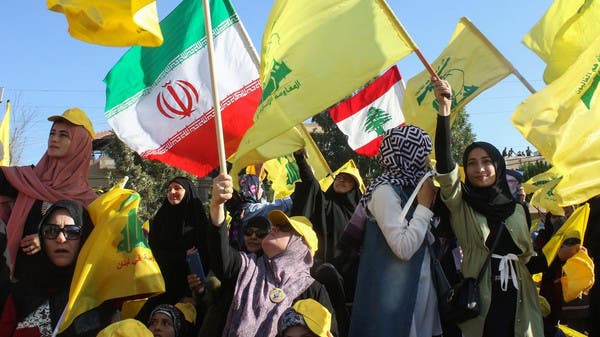Israel and Hezbollah’s tug of war
Hanin Ghaddar/Al Arabiya/April 21/2020
حنين غدار/شد حبال الحرب بين إسرائيل وحزب الله
Despite the coronavirus pandemic that has engulfed the world, and has also consumed the efforts of the governments in Lebanon and Israel for more than a month, it seems that Israel and Hezbollah still have time to carry out security and military operations, albeit cautiously.
Last week, Hezbollah said an Israeli drone destroyed one of its vehicles in Syria near the Syria-Lebanon Masnaa border crossing. Lebanon has also reported more Israeli drones flying over Beirut recently. A few days later, Israel accused Hezbollah of provocative activity along the Lebanese-Israeli border and said it would complain to the UN Security Council.
In a statement, Israeli Foreign Minister Israel Katz accused Hezbollah of multiple attempts to breach the border after the Israeli military said its military fence that lies just inside Israeli territory was damaged in three places.
Earlier this month, a senior Hezbollah commander was killed in southern Lebanon. Ali Mohammed Younis was pulled from his car, stabbed, and shot on a road near the city of Nabatieh. Younis was in charge of operations to locate spies and collaborators in the group, according to Iran’s Fars news agency, which is close to the Islamic Revolutionary Guard Corps (IRGC).
A number of reports surrounding his killing have emerged. Hezbollah’s media first accused Israel of assassinating Younis. However, other reports indicated that it was an internal job.
In any case, this incident shows a certain weakness within Hezbollah’s security apparatus. If it was an Israeli operation, this would mean that Hezbollah’s security has been breached. If it was an internal job, it indicates that Hezbollah has serious issues within its supposedly tight operations and security organization.
This series of operations could develop into a more serious confrontation between Hezbollah and Israel, but it is unlikely. However, three pertinent issues need to be addressed.
First, these incidents indicate that the ongoing conflict between Hezbollah and Israel – which has played out in Syria for a number of years – is moving back to Lebanon, opening a wide range of scenarios and possibilities that might move Lebanon into a new conflict zone. Israel has worked relentlessly to weaken and diminish Iran’s presence and power inside Syria. And despite the major losses that Hezbollah has suffered in Syria due to continuous Israeli strikes on its personnel, military facilities, and arms depots, Hezbollah and other Iran-backed Shia militias have not retaliated – at least militarily – to these Israeli strikes. The fact that Hezbollah damaged Israel’s security fence on the Lebanese-Israeli border – despite the insignificance of the damage – is a sign that Hezbollah could retaliate from Lebanon, which is a new development.
Second, the drone incident demonstrates that Israel is still watching Hezbollah, and the Lebanese group seems to be continuing its work on the Precision Missiles Project. Developing precision missiles that would help Iran attack specific targets and infrastructure inside Israel has been Hezbollah’s main priority for a few years, and they don’t seem to have slowed down because of the pandemic or its own financial crisis. In fact, Hezbollah has proved that it prefers spending its resources on these missiles rather than on serving its Shia constituency. However, this project is also Israel’s main priority regarding Hezbollah, and they won’t turn a blind eye to this risk, no matter how distracted they are internally.
Third, Hezbollah has been walking a fine line. They cannot stop developing the precision missiles because Iran demands they continue work, but they also cannot risk a war with Israel. They know they will probably lose in any military conflict with their southern rival.
Hezbollah lacks the money and resources to fund a new war with Israel, which seems to be more eager to hurt Hezbollah during the next round of confrontation. But Hezbollah has also lost many of its senior commanders in Syria. Having lost IRGC commander Qassem Soleimani when he was killed in January as well, it will take years to restore its leadership and military apparatus. Militarily, Hezbollah is also not ready. But most significantly, Hezbollah is mostly worried about the post-war reconstruction. With the current pro-Hezbollah Lebanese government, and the many ongoing wars in the region, it is highly unlikely that the international community – mainly the Gulf States that helped reconstruct Lebanon after the 2006 July war – would help reconstruct Lebanon this time around.
And without the bags of cash coming from Iran, Hezbollah will not be able to do the job itself. With the additional financial and economic crises that Lebanon is facing, which could lead to another wave of protests after the coronavirus lockdown is over, Hezbollah and the Lebanese government would have to acknowledge this growing discontent locally, weakening further their ability to respond to Israel.
While walking this fine line, Hezbollah is continuing to send messages to Israel, without provoking it, and without allowing this tug of war to develop into a full-fledged conflict. However, mistakes can be made, and if Hezbollah falls off the edge and Israel fires the first bullet, it won’t necessarily mean that Israel has started the war. By bringing Iran’s Precision Missiles Project to Lebanon, Hezbollah started the war a while ago.
*Hanin Ghaddar is the inaugural Friedmann Visiting Fellow at The Washington Institute’s Geduld Program on Arab Politics, where she focuses on Shia politics throughout the Levant.























